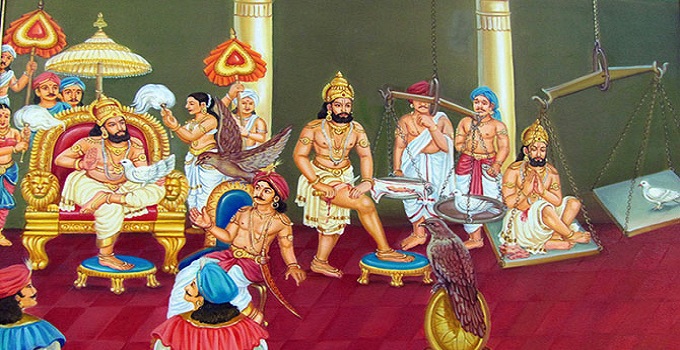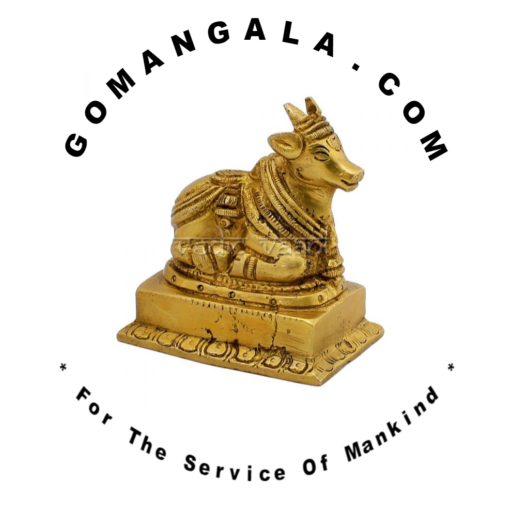Mrigaswapnodbhava Parva is the fortieth upa parva included in the third maha parva, named as Vana parva or Aranyaka parva in the epic Mahabharata. The original epic was composed by Vyasa in Sanskrit. Vyshampayana had narrated to Janamejaya the historical events, happened in the forests on his queries.
How the presence of Pandavas occasionally affected the forest animals adversely?
Ghatotkacha had visited Bhima frequently since Bhima was his father. Since he was a demon, he liked to eat forest animals. Also, the brother in law of Nakula, Drishtaketu, occasionally visited Pandava brothers. Krishna had killed Ekalavya and later the eldest son of Ekalavya had been crowned for Indraprastha. He was also in good terms with Padavas and occasionally visited them in exile.
These visitors of Pandavas occasionally adversely affected forest animals due to their hunting habits. But Pandava brothers preferred only vegetarian food and were satisfied by the daily balance food of Akshayapatra. First, Draupadi was serving the poor Brahmins using the food received from the Akshayapatra and then the Pandava brothers were eating the balance food. Yudhishtira, Arjuna, Sahadeva and Draupadi were eating only vegetarian food.
What happened to Yudhishtira in the Dvaitavana in the night after Ghoshayatra?
Duryodhana with the hunters of Hastinapura had entered the Dvaitavana and the rare species like deer had been shot dead and their number had been decreased. In the previous occasion, Vyasa had already advised Yudhishtira not to stay for a long time in the same forest. Yudhishtira had dreamt about four deers and they had pleaded with him to allow them to live in Dvaitavana and bless their species by leaving them to live longer safely there.
आहारात्सर्वभूतानि सम्भवन्ति महीपते । आहारेण विवर्धन्ते तेन जीवन्ति जन्तवः ॥
Meaning: By consuming the food, every creatures are living on this Earth. By food, they are growing. O owner of land! By food only, every materials are happening.
Yudhishtira decided to leave Dvaithavana. On the following day, Yudhishtira had moved again to Kamyakavana with his brothers.
यस्तु शूद्रो दमे सत्ये धर्मे च सततोत्थितः । तं ब्राह्मणमहं मन्ये वृत्तेन हि भवेद्विजः ॥
Meaning: If a person is shudra by birth and if he worships good habits like truthfulness, performance of his Dharma, keeps controlled his anger, then he is treated as a Brahmin since by works and actions only one becomes a Brahmin.
What is the difference between an angel and a demon? How Kubera the brother of the demon Ravana was treated as an angel?
The classifications of Angels or Demons are considered according to the actions or the nature of works as well as based on the characters of their performers. Even though Ravana and Kubera were born as children to Pulasthya, their actions were entirely different.
Kubera had possessed good characters and lived at Kailasa Mountain as treasurer to God Shiva. He served Gods and hence was considered as an angel. Ravana had possessed very cruel characters. He had lived with ego at Lanka and self-proclaimed as the king of demons. Initially, the aero plane, Pushpaka Vimana was allotted to Kubera but later Ravana had grabbed that also. He served demons and was considered as a cruel demon, and hence finally Sri Rama had to kill him.
What was the story of the great donor king Ushinara of Shibi told by Lomasha?
Ushinara was the king of a big country and it was called as Shibi. Ushinara had performed many Yajnas and then the leader in the heaven was afraid of his position. Ushinara continued his performances with strong determination. The Yajnashala and the court hall were adjacent and his country people were satisfied by his ruling.
One day, after meals, the king was in his throne and suddenly, one dove had entered the hall and sat on his lap. It was trembling with fear of life. It was looking at all sides and suddenly a vulture had also entered into the court hall.
The vulture was very big and sat in front of the king and started to speak with the king. People had assembled in the hall after meals but the vulture was hungry and intended to eat the dove. The king thought to give the flesh of some other animals to feed the vulture. Then he replied he would not like to eat any other kind of meat.
श्येनाः कपोतान्खादन्ति स्थितिरेषा सनातनी । मा राजन्मार्गमाज्ञाय कदलीस्कन्ध मारुह ॥
Meaning: From the time of Sanatana Dharma itself, vultures used to eat Dove, don’t misguide me like a person who does not know the right path showing to climb a plantain tree.
Then the king Ushinara politely consulted the vulture what could be done by him to satisfy his hunger. Then the vulture had requested him to provide his own flesh equivalent to the weight of the dove.

Immediately, the king ordered to bring a balance and requested the dove to sit on one of the pans. With his royal sword he had cut his own flesh and put on the other pan. The vulture could eat only flesh and he had to avoid the bones or any other organs of his body. He added maximum flesh from his body but the dove found heavier and the king could not equalize the balance with his flesh alone. The next option left for the king was to sit by him on the pan. Momentarily the balance found equalized and both the birds disappeared.
इन्द्रोऽहमस्मि धर्मज्ञ कपोतो हव्यवाक्कयं । जिज्ञासमानौ धर्मे त्वां यज्ञवाटमुपागतौ ॥
Meaning: O knower of Dharma, I am the Indra. The dove is the transporter of oblations, means Agni. We had come here, intended to test your sincerity in Dharma and in the current Yajnas.
Immediately, everybody had observed the king in normal status and heard the voice but could not see any angels there. The people of Shibi country felt happy and the priests told him he had been blessed by the heavenly angels.
यावल्लोके मनुष्यास्त्वां कथयिष्यन्ति पार्थिव । तावत्कीर्तिश्च लोकाश्च स्थास्यन्ति तव शाश्वताः॥
Meaning: O king of the Earth! As long as people used to tell about your story of donations, till so long in time your name would be remembered permanently on this Earth with your fame shining forever.
On reaching Kamyakavana again with brothers and Draupadi, Yudhishtira was greeted by Vyasa. Yudhishtira was happy to hear more interesting stories from Vyasa and hence Vyasa had started the story of Vrihidrounika.
On reading this story, children would gain more memory power.
Next post, Mahabharat: Vrihidrounika would be more interesting.
Mahabharat: Draupadiharana would be presented separately in another article.
It is humbly prayed for the blessings of God Krishna upon us.
Readers may share this story with children, friends and family.

Leave a Reply